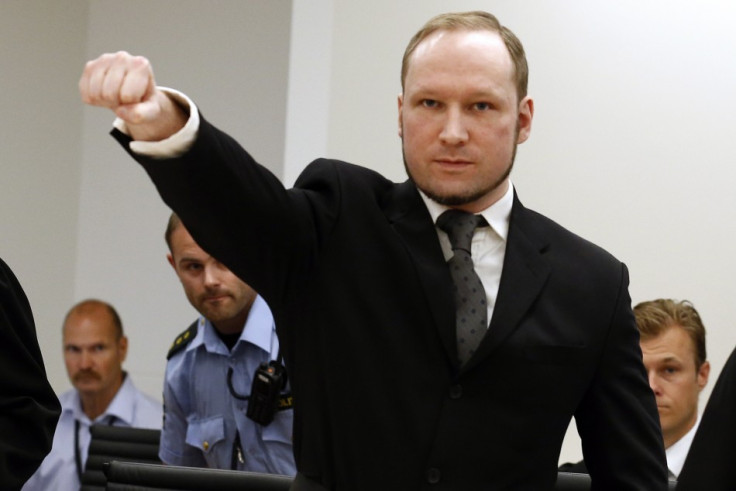Neo-Nazi lone-wolf attacks in Europe are more deadly than Isis-inspired terrorist plots

"Lone wolf" attacks by the far-right in Europe have been more lethal than those inspired by the Islamic State (Isis), a comprehensive study into extremism has found. While Islamist attacks have been the focus of counter-terrorism investigations, researchers say plots by individuals and small groups of right-wing extremists – like Norway's Anders Breivik – are more deadly and almost as numerous.
Britain leads every other European country for the number of attacks or plots over the past 15 years that have been planned by individuals or self-starting cells, according to the report by four research institutes. Almost half of the right-wing attacks – which range from mosque arson to the bombing of Islamic centres – were said to be partly motivated by the murder of soldier Lee Rigby.
This includes a revenge attack in January 2015 by neo-Nazi Zack Davies, who was jailed for attempted murder when he attempted to behead a Tesco shopper in Mold, Flintshire. Another anti-Islam attack, in 2013, saw white supremacist Pavlo Lapshyn stab a Muslim grandfather to death in the West Midlands and plant explosives at mosques in an attempt to trigger a race war.
Analysis from 31 countries in Europe found there had been 124 individuals involved in 98 attacks or plots between 2000 and 2014. The UK topped the list with 38 attacks and France came second with 11. Germany and Sweden both reported five.
The report said while lone-actor terrorism in Europe is "rare", analysis suggests an overall increase across Europe during the past 15 years. It warns the threat is being neglected by European governments and law enforcement agencies.
Melanie Smith, co-author of the report, said: "Religiously-inspired terrorists remain the primary concern for European governments. However, our research shows that extreme right lone actors are almost equal in number.
"The majority of policing and security resources remain focused on preventing attacks from Isis-inspired individuals. This needs to change in light of the refugee crisis. European governments need to commit more resources to detecting and preventing extreme right lone actor terrorists."

The 98-page report is the culmination of an 18-month project called Countering Lone-Actor Terrorism (CLAT), a joint-programme by the Royal United Services Institute (RUSI), Chatham House, the Institute for Strategic Dialogue, and the University of Leiden.
Researchers defined "lone actor" terrorism as attacks carried out by individuals or small groups of up to three people "without any direct support in the planning, preparation and execution of the attack, and whose decision to act is not directed by any group or other individuals". The study found a third of all perpetrators were right-wing extremists, almost as high as the 38% who were religious fanatics. Anarchists and far-left groups were accounted for just 2%.
Of the 72 successfully launched attacks within the database, religiously inspired
attacks caused only 8% of fatalities while right-wing terrorist attacks accounted for almost half of fatalities.
The most frequent targets were civilians, in particular ethnic and religious minorities, asylum seekers and immigrants. A large majority of religious targets were Muslim.
Lone-actor terrorists with military training or experience were more lethal than their counterparts, accounting for 19% of perpetrators but 29% of fatalities.
Anti-Islam motives
This does not include the single most deadly attack included in the study, however, carried out by right-wing fanatic Anders Breivik. On 22 July 2011, Breivik killed 77 people and injured 242 others when he bombed government building's in Oslo and gunned down teenagers at a summer camp on the Norwegian island of Utoya. Breivik's motive was linked to far-right political views which opposed Islam and called for all Muslims to be deported from Europe.
Researchers said this world view was a trend among far-right plots, adding: "Among the right-wing perpetrators in the dataset, there is a strong emphasis on immigration policy, a wish to inspire patriotism and to defend their country from what they term 'Islamisation'.
"This reflects a shift within broader right-wing extremism, with many groups and individuals – including Breivik – denouncing Nazism, fascism and anti-Semitism, and instead defining their cause as defence against a perceived threat from Islam.
"Examining the influence of specific events, in Great Britain there are indications that 47% of right-wing perpetrators were in part motivated by the murder of Lee Rigby. These cases include arson attacks and the bombing of Islamic centres."
The report found while 88% of religiously-motivated terrorists were caught through intelligence-led intervention, 40% of right-wing extremists were only uncovered "with an element of chance", sometimes because the perpetrator accidentally detonated a device.
It concluded law enforcement agencies needed to do more to catch right-wing attacks before they happened, including focusing on social media activity of even non-violent far-right groups. Public awareness programmes – like the UK government's Prevent strategy – should also encompass the "lone actor" terrorism threat, it added, offering "guidance for identifying those vulnerable to being drawn into all forms of terrorism".
Smith said: "Police and security services should continue to monitor non-violent groups, particularly on public social media platforms, to spot individuals who may be becoming violent."
© Copyright IBTimes 2025. All rights reserved.






















